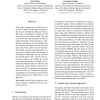Free Online Productivity Tools
i2Speak
i2Symbol
i2OCR
iTex2Img
iWeb2Print
iWeb2Shot
i2Type
iPdf2Split
iPdf2Merge
i2Bopomofo
i2Arabic
i2Style
i2Image
i2PDF
iLatex2Rtf
Sci2ools
EUSFLAT
2003
2003
Genetic fuzzy systems to evolve coordination strategies in competitive distributed systems
This paper suggests an evolutionary approach to design coordination strategies, a key issue in distributed intelligent systems. We focus on competitive strategies in the form of fuzzy rule-based models. The aim is to evolve data and rule bases to improve agent performance when playing in a competitive environment. In this situation, data for learning and tuning are rare and rule base must jointly evolve with the database. We suggest a genetic algorithm whose operators use variable length chromosome, a hierarchical relationship among individuals through fitness, and a scheme that successively explore and exploits the search space along generations. Evolution of coordination strategies uncovers unknown and unexpected agent behaviors and allows a richer analysis of negotiation mechanisms and their role as a coordination protocol. An application concerning an electric power market illustrates the effectiveness of the approach.
| Added | 31 Oct 2010 |
| Updated | 31 Oct 2010 |
| Type | Conference |
| Year | 2003 |
| Where | EUSFLAT |
| Authors | Igor Walter, Fernando A. C. Gomide |
Comments (0)

